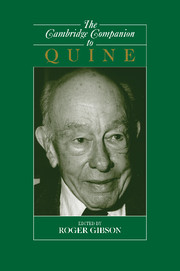Book contents
- Frontmatter
- Willard Van Orman Quine
- 1 Aspects of Quine’s Naturalized Epistemology
- 2 Quine on the Intelligibility and Relevance of Analyticity
- 3 Quine’s Meaning Holisms
- 4 Underdetermination of Physical Theory
- 5 Quine on Reference and Ontology
- 6 Indeterminacy of Translation
- 7 Quine’s Behaviorism cum Empiricism
- 8 Quine on Modality
- 9 Quine and Logical Positivism
- 10 Quine and Logic
- 11 Quine on Quine
- Selected Bibliography
- Index
2 - Quine on the Intelligibility and Relevance of Analyticity
Published online by Cambridge University Press: 28 May 2006
- Frontmatter
- Willard Van Orman Quine
- 1 Aspects of Quine’s Naturalized Epistemology
- 2 Quine on the Intelligibility and Relevance of Analyticity
- 3 Quine’s Meaning Holisms
- 4 Underdetermination of Physical Theory
- 5 Quine on Reference and Ontology
- 6 Indeterminacy of Translation
- 7 Quine’s Behaviorism cum Empiricism
- 8 Quine on Modality
- 9 Quine and Logical Positivism
- 10 Quine and Logic
- 11 Quine on Quine
- Selected Bibliography
- Index
Summary
W. V. O. Quine ’s “Two Dogmas of Empiricism” (TDEa 20-43) is perhaps the most famous paper in twentieth-century philosophy. Certainly, it is the most widely reproduced of Quine’s works. Even if it had been ignored, it would still hold a special place for Quine, for to a large extent Quine has defined himself and his philosophy in opposition to Rudolf Carnap’s separation of our scientific claims into the analytic and the synthetic as well as in opposition to any theory of knowledge, such as Carnap’s, in which the analytic-synthetic distinction figures so prominently. “Two Dogmas” is central to Quine’s work if only because it contains his first sustained public attack on analyticity. Moreover, the paper’s last section is the first, and one of the most systematic, of his sketches of an alternative epistemology.
Given the amount of attention that “Two Dogmas” has had and the variety of its readers, it is hardly surprising that its arguments have been variously understood. It has been called an attack on empiricism or on reductionism. It has been said to embrace a behaviorism of an antitheoretical sort. The fault that it finds in analyticity is sometimes said to lie in the circularity of the definitions for it. None of this seems to me to be very likely. Sometimes the paper is said to say exactly what Quine was saying nearly fifty years later. This also seems unlikely, for Quine continued to develop and modify his arguments and to reassess their relative importance. Nor is it surprising that he would have. Indeed, the rich body of Quine’s later writings and discussions can be a hindrance as well as a help in understanding what some earlier passage may have meant, either to Quine or to his readers. Such evidence should be used, of course, but with caution.
- Type
- Chapter
- Information
- The Cambridge Companion to Quine , pp. 47 - 64Publisher: Cambridge University PressPrint publication year: 2004
- 4
- Cited by



